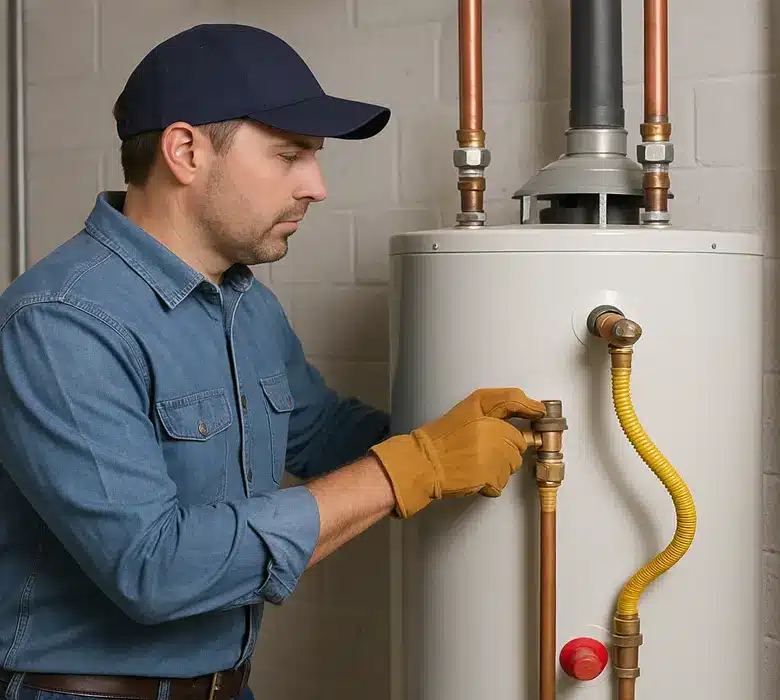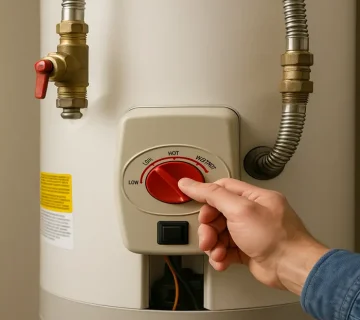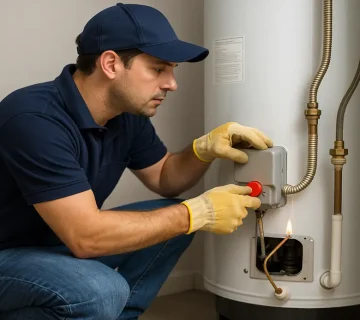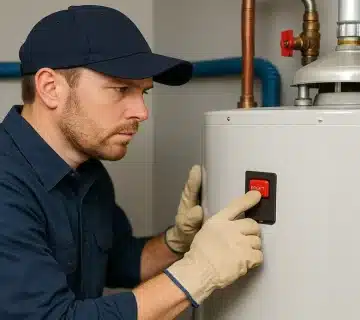Your water heater runs quietly in the background, providing hot water whenever you need it. But there are times when shutting it off is the smartest move. Knowing how to turn off water heater properly can prevent damage, save money, and even protect your home.
This step-by-step guide shows you when, why, and how to shut down both gas and electric models safely.
When Should You Turn Off a Water Heater?
- During maintenance or repair: Always shut it down before a plumber works on it.
- If there’s a leak: Quick action prevents flooding and water damage.
- Before leaving on vacation: Save energy when no one will be home.
- After strange noises or smells: Protect your family from safety risks.
7 Simple Steps: How to Turn Off Water Heater
- Locate the power or gas supply
- Electric: Flip the breaker labeled “Water Heater” in your panel.
- Gas: Turn the shutoff valve knob or lever to OFF.
- Turn off the thermostat
- Set it to “Pilot” or the lowest setting. Pilot Lights.
- Shut off the water supply
- Twist the cold water inlet valve clockwise to stop flow.
- Turn off the gas completely (for gas heaters)
- Close the gas valve to eliminate any risk.
- Unplug the unit (for electric models)
- Disconnect the power cord if accessible.
- Drain the tank if needed
- Connect a garden hose to the drain valve and direct water outside.
- Double-check
- Confirm both water and power are fully shut off.
Gas vs. Electric: Key Differences
- Gas heaters: You must shut off the gas supply and pilot light. Failing to do so can leave a safety risk. If you’re unsure, it’s always safest to call a licensed technician.
- Electric heaters: Make sure the breaker is fully off. Don’t rely only on the thermostat switch. Unplugging the unit, if possible, provides extra peace of mind.
For gas-powered tanks, here’s a helpful walkthrough on safely shutting off the gas supply: Turning Off Gas to a Water Heater.
Common Mistakes to Avoid
When learning how to turn off water heater, many homeowners make simple mistakes:
- Forgetting to close the water supply valve.
- Turning off electricity but leaving the gas line on.
- Not waiting for the water to cool before draining, which can cause burns.
- Using the wrong tools and damaging the drain valve.
Avoiding these mistakes ensures your shutdown process is safe and effective.
If something still seems off after shutdown, try these DIY water heater fixes before you call a pro.
Why Knowing How to Turn Off Water Heater Matters
- Prevents costly accidents during emergencies.
- Saves money on energy bills while away.
- Extends the unit’s life by reducing wear during downtime.
- Improves home safety by lowering the risk of leaks, overheating, or gas issues.
- It also gives you confidence to handle unexpected situations without waiting for professional help.
Hearing pops or rumbling? Learn the causes and noise fixes to keep things safe and quiet.
FAQs: How to Turn Off Water Heater
Q: Do I need to turn it off when I leave for a week?
Not always, but it can save energy and protect your system from unexpected issues.
Q: How long does it take to cool after turning it off?
Typically 1–2 hours for an average-size tank before it’s safe to drain or maintain.
Q: Do I need tools to turn it off?
Most valves are hand-operated. Still, having a wrench or pliers helps if a valve is stiff.
Q: Should I drain it every time I shut it off?
No. Draining is only necessary for maintenance or long shutdowns.
Heading out in cold weather? Follow these freeze-prevention tips after turning the heater off.
Final Thoughts
Learning how to turn off water heater is a simple skill that protects your home, wallet, and peace of mind. By following the right steps and avoiding common mistakes, you’ll ensure safety during repairs, prevent costly water damage, and reduce wasted energy.
Taking a few minutes to learn this process now means you’ll be prepared for emergencies, routine maintenance, or even saving money while you’re away from home.
Whether you own a gas or electric model, knowing when and how to turn off water heater is an essential part of homeownership.





